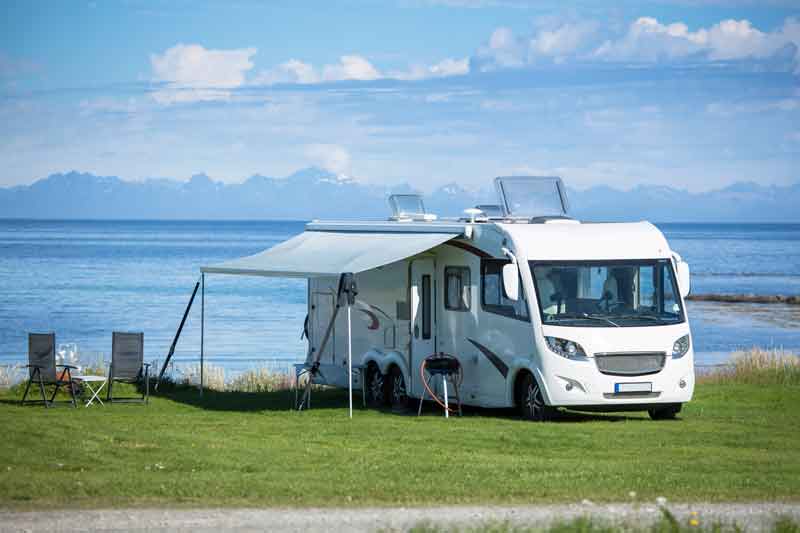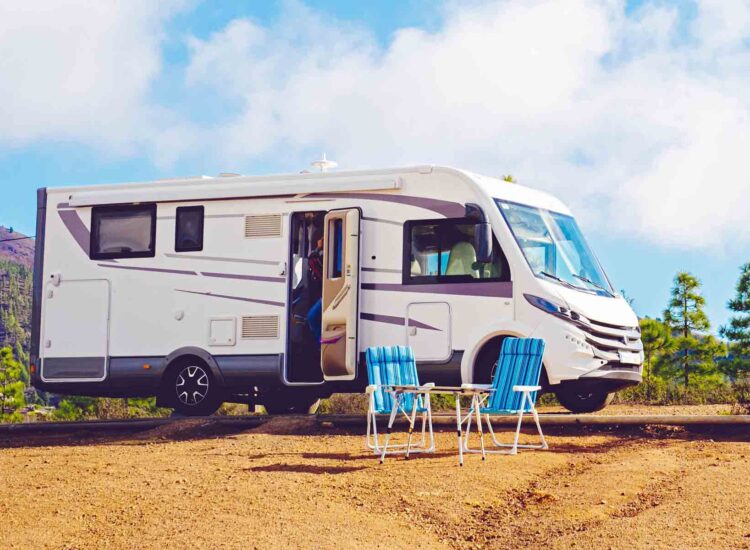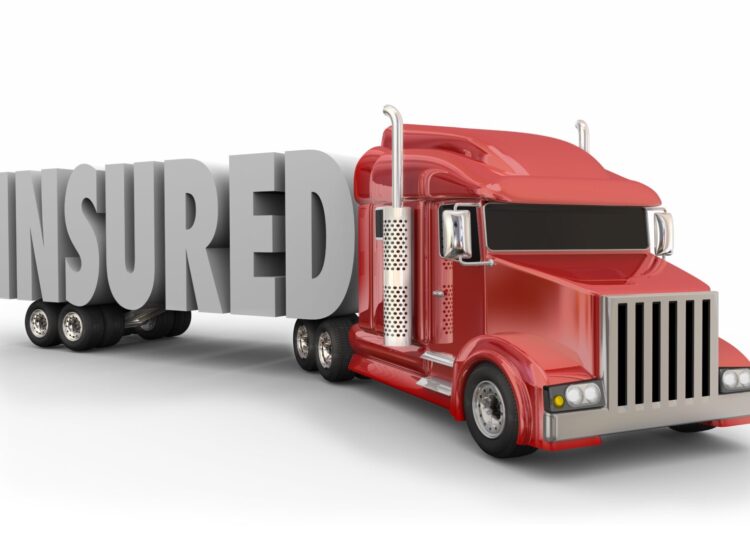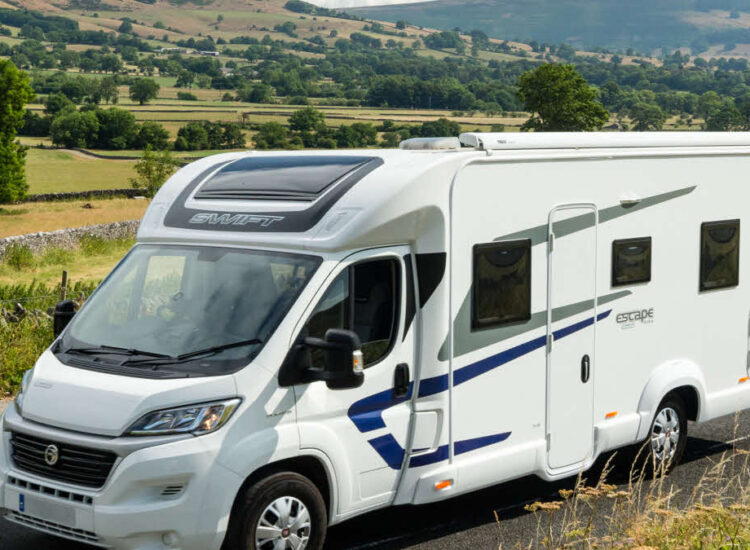The dream of hitting the open road, exploring new landscapes, and waking up to a different view every day has captured the imagination of many. For a growing number of enthusiasts, the Recreational Vehicle (RV) makes this dream a reality. An RV is more than just a vehicle; it’s a home away from home, a mobile basecamp for adventure, and a significant investment. As RV ownership grows, so does the critical need for comprehensive protection. This protection comes in the form of RV insurance.
Toc
- 1. Why RV Insurance is Absolutely Essential
- 2. Key Types of RV Insurance Coverage
- 3. Related articles 01:
- 4. Factors That Affect Your RV Insurance Costs
- 5. Different Types of RVs and Insurance Considerations
- 6. Related articles 02:
- 7. How to Choose and Purchase the Right RV Insurance Policy
- 8. Conclusion: Insuring Your RV for Peace of Mind on the Road
Why RV Insurance is Absolutely Essential

Owning an RV is a source of immense joy and freedom, but it also comes with responsibilities and potential risks. Here’s why having the right RV insurance policy is non-negotiable:
-
Protecting Your Significant Investment: RVs, especially motorhomes (Class A, B, and C), represent a substantial financial outlay, often comparable to the cost of a house. Accidents, theft, vandalism, natural disasters, or fire can cause extensive damage, leading to massive repair or replacement costs. RV insurance acts as a financial safety net, safeguarding your investment against these unforeseen events.
-
It’s a Home on Wheels: Your RV isn’t just for driving; it’s where you live, sleep, cook, and relax while traveling. It contains furniture, appliances, electronics, clothing, and other personal belongings – all valuable items. Unlike a standard auto policy, comprehensive RV insurance includes coverage for your personal property inside the RV, treating it more like a dwelling.
-
Unique Risks: RVs are larger, heavier, and handle differently than passenger cars. This means they can pose different risks on the road, requiring longer stopping distances and greater caution in tight spaces or challenging weather. Furthermore, when parked at campsites or storage facilities, RVs face unique risks like damage from falling trees, theft of outdoor equipment, or liability issues related to the campsite setup. RV insurance is tailored to cover these specific scenarios.
-
Liability Protection: Just like driving any vehicle, operating an RV carries the risk of causing damage or injury to others. If you’re at fault in an accident that injures another person or damages their property, you could face expensive medical bills, repair costs, and legal fees. RV insurance includes crucial liability coverage to help pay for these costs, protecting your financial future. In most places, liability insurance is a legal requirement for registering and driving any vehicle, including RVs.
-
Peace of Mind: Knowing that you, your passengers, your vehicle, and your belongings are protected allows you to fully relax and enjoy the freedom and adventure that RV travel offers. It removes a significant source of potential stress, letting you focus on the journey and the destination.
Key Types of RV Insurance Coverage
A comprehensive RV insurance policy is typically a package of different types of coverage, each designed to protect against specific risks. Here are the common types of coverage you’ll find:
-
Liability Coverage:
- Bodily Injury Liability: Pays for medical expenses, funeral costs, and lost wages for others who are injured or killed in an accident you cause while operating your RV.
- Property Damage Liability: Pays for the cost to repair or replace property belonging to others that you damage in an accident you cause (e.g., hitting another vehicle, a fence, a building).
- Importance: This is the foundational and often legally mandated type of RV insurance. It shields you from expensive lawsuits and claims from third parties. The coverage limits you choose should be high enough to adequately protect your assets.
-
Physical Damage Coverage:
- Collision Coverage: Covers the cost to repair or replace your RV if it’s damaged in a collision with another vehicle, object (like a tree or pole), or if it rolls over, regardless of who is at fault. You’ll pay a deductible (your out-of-pocket expense) before the insurance pays the rest.
- Comprehensive Coverage: Covers damage to your RV caused by events other than collision, such as:
- Theft or vandalism
- Fire
- Natural disasters (storms, floods, earthquakes, lightning)
- Hitting an animal
- Falling objects (branches, rocks from the road)
- Importance: These coverages protect your actual RV. Comprehensive is particularly important because RVs are exposed to various non-driving risks when parked.
-
Medical Payments / Personal Injury Protection (PIP):
- Pays for reasonable and necessary medical expenses for you and your passengers if you are injured in an accident involving your RV, regardless of who is at fault. PIP may also cover other costs like lost wages or essential services.
-
Uninsured/Underinsured Motorist Coverage:
- Pays for injuries to you and your passengers, and in some cases, damage to your RV, if you are involved in an accident caused by a driver who has no insurance (uninsured) or not enough insurance (underinsured) to cover your losses.
- Importance: This is a vital safety net, given that not all drivers carry adequate insurance coverage.
-
Personal Property Coverage:
- This is a key differentiator for RV insurance. It covers the loss or damage of your personal belongings inside the RV due to theft, fire, or other covered perils. This includes items like electronics, furniture, clothing, kitchenware, and outdoor gear stored in the RV. Coverage limits apply, and you may need to purchase additional coverage for high-value items.
-
Custom Parts and Equipment Coverage:
- If you’ve invested in upgrading or customizing your RV (e.g., solar panels, upgraded sound systems, special interior finishes), this coverage pays to repair or replace those custom additions if they’re damaged in a covered incident.
-
Campsite / Vacation Liability:
- This coverage provides liability protection when your RV is parked and being used as a temporary residence at a campground or RV park. It can cover costs if someone is injured near your RV or if their property is damaged due to something related to your RV setup while parked (e.g., someone trips over your awning tie-down, a fire starts from your RV and spreads). This is especially useful if you frequently use your RV for vacations or rent it out.
-
Roadside Assistance / Towing Coverage:
- Covers the cost of emergency services on the road, such as towing your RV to the nearest repair shop, flat tire changes, fuel delivery, or battery jump-starts when your RV is disabled. Given the size and complexity of RVs, towing costs can be significant, making this a valuable add-on.
-
Total Loss Gap Coverage:
- If your RV is financed and declared a total loss (damaged beyond repair), this coverage pays the difference between the actual cash value of the RV (what the insurance company determines it’s worth) and the remaining balance on your loan. This prevents you from owing money on an RV you no longer have.
When purchasing RV insurance, you’ll typically build a policy by selecting these different coverage components. The level of protection (coverage limits) and your deductible (your out-of-pocket expense) for each component will impact your final premium.
Factors That Affect Your RV Insurance Costs

The cost of RV insurance is not one-size-fits-all. Several factors come into play when calculating your premium:
-
Type and Value of Your RV: This is the most significant factor.
- RV Class/Type: Motorhomes (Class A, B, C) are generally more expensive to insure than towable RVs (Travel Trailers, Fifth Wheels, Pop-ups) because they are self-propelled vehicles with engines and often higher values. Class A motorhomes usually have the highest premiums.
- Value: Newer, more expensive RVs with higher replacement costs will have higher physical damage premiums.
- Age: Older RVs may have lower physical damage premiums (due to depreciation), but liability costs may not change significantly.
-
How You Use Your RV:
- Full-Time Usage: If your RV is your primary residence (you live in it year-round), you’ll need a full-timer RV insurance policy. These policies offer broader coverage similar to homeowners insurance and are significantly more expensive than recreational-use policies.
- Recreational Usage: If you only use your RV for occasional trips and vacations, you’ll qualify for recreational RV insurance, which has lower premiums.
-
Your Driving Record: A clean driving history with no accidents or violations will help you get lower RV insurance rates. A history of tickets or accidents will increase your premium.
-
Where You Live and Store Your RV:
- Insurance rates can vary based on your geographical location. Areas with higher rates of theft, vandalism, or accident claims may result in higher premiums.
- Where you store your RV when not in use (in a secure garage, driveway, storage facility) also affects the risk and, consequently, your premium.
-
Your Coverage Levels and Deductibles:
- Coverage Limits: Higher liability, comprehensive, and collision limits result in higher premiums.
- Deductibles: Choosing a higher deductible (the amount you pay out-of-pocket before insurance kicks 1 in) for physical damage coverages will lower your annual premium, but you’ll pay more upfront if you file a claim.
1. insurancebest1.tistory.com
-
Other Factors:
- Your Age and Experience: Younger, less experienced drivers may face higher premiums.
- Claim History: Having multiple past insurance claims can increase your rates.
- RV Safety Features: Anti-theft devices, tracking systems, and advanced braking systems can sometimes qualify you for discounts.
- Discounts: Many insurers offer discounts for safe drivers, bundling multiple policies (like auto and RV insurance), belonging to RV clubs, or completing safe driving courses.
Different Types of RVs and Insurance Considerations
The type of RV you own significantly impacts your insurance needs and costs. Here’s a quick look at common types:
2. https://duocphamvietduc.com.vn/mmoga-a-comprehensive-guide-to-motorcoach-insurance/
5. https://duocphamvietduc.com.vn/motor-home-insurance-your-guide-to-protecting-your-rv-in-2025/
- Class A Motorhomes: The largest and most luxurious motorhomes, built on a bus or truck chassis. They are typically the most expensive to insure due to their high value and complexity. Full-timer RV insurance is common for these.
- Class B Motorhomes (Camper Vans): Built on a van chassis, these are smaller and more maneuverable. Insurance costs are generally lower than Class A or C, but still higher than towable RVs.
- Class C Motorhomes: Built on a cutaway van chassis with an over-cab sleeping area. They offer a balance of size and features and fall in the mid-range for insurance costs among motorhomes.
- Fifth-Wheel Trailers: Large trailers towed by a pickup truck with a special hitch in the truck bed. Insurance is typically separate from the tow vehicle’s policy and focuses on the trailer’s value and liability when detached.
- Travel Trailers: Towable trailers that attach to the tow vehicle’s bumper hitch. Like fifth-wheels, they require separate RV insurance for the trailer itself.
- Pop-Up Campers (Folding Camping Trailers): The lightest and most basic towable RVs. Insurance costs are the lowest among RV types due to their lower value and simpler construction. Liability while being towed is usually covered by the tow vehicle’s policy, but you’ll need coverage for physical damage and potentially liability when parked.
For towable RVs, ensure your tow vehicle’s insurance covers liability while towing, but always get dedicated RV insurance for physical damage to the trailer itself and liability when it’s detached and parked.
How to Choose and Purchase the Right RV Insurance Policy
Finding the best RV insurance policy requires careful consideration. Here’s a step-by-step approach:
-
Assess Your Specific Needs:
- What is the market value or replacement cost of your RV?
- How often do you use it, and for what purpose (recreational vs. full-time)?
- What is the value of the personal property you keep inside?
- What level of liability protection do you need based on your assets?
- What deductible amount are you comfortable with?
-
Research and Compare Insurers:
- Look for insurance companies that specialize in RV insurance or have strong RV programs. Not all insurers offer robust RV coverage.
- Read reviews and check the insurer’s reputation, particularly regarding their claims handling process. A good claims experience is vital when something goes wrong.
-
Get Multiple Quotes:
- Contact several different insurance providers (or use an independent insurance agent who works with multiple companies) to get quotes for the coverage you need.
- Ensure you are comparing the same types and levels of coverage from each insurer to get an accurate comparison.
-
Understand the Coverage Details:
- Don’t just look at the price. Carefully review the policy documents for each quote.
- Pay close attention to:
- Coverage Limits: Are they sufficient?
- Deductibles: Are they manageable?
- Exclusions: What is not covered by the policy?
- Specific RV Coverages: Does the policy include crucial coverages like personal property, full-timer coverage (if needed), or vacation liability?
-
Ask Questions:
- Don’t hesitate to ask the insurance agent or representative questions about anything you don’t understand. Clarify coverage, exclusions, and the claims process.
-
Consider Replacement Cost vs. Actual Cash Value:
- When insuring physical damage, understand whether the policy covers the “actual cash value” (the value of the RV minus depreciation) or the “replacement cost” (the cost to replace the RV with a new, similar one). Replacement cost coverage is more expensive but offers better protection for newer RVs.
-
Review and Update Periodically:
- Your RV’s value depreciates, and your usage patterns or personal property might change. Review your RV insurance policy annually to ensure it still meets your needs and that your coverage levels and premium are appropriate.
Conclusion: Insuring Your RV for Peace of Mind on the Road
Owning an RV is about embracing freedom, adventure, and the joy of exploring. It’s about creating lasting memories with family and friends on the open road. To truly enjoy this lifestyle without constant worry, protecting your valuable asset and yourself from potential risks is paramount. That’s where robust RV insurance comes in.
Understanding the different types of coverage, recognizing the factors that influence costs, and taking the time to compare policies from reputable providers are crucial steps in securing the right protection. RV insurance is not just another bill; it’s an investment in your peace of mind, ensuring that unexpected incidents don’t derail your dreams of exploration.
By securing comprehensive RV insurance, you’re safeguarding your investment, protecting your family and belongings, and ensuring that help is available when you need it most. So, before you embark on your next great adventure, make sure your “home on wheels” is adequately protected. Happy travels, and may your journeys always be safe and well-insured!





